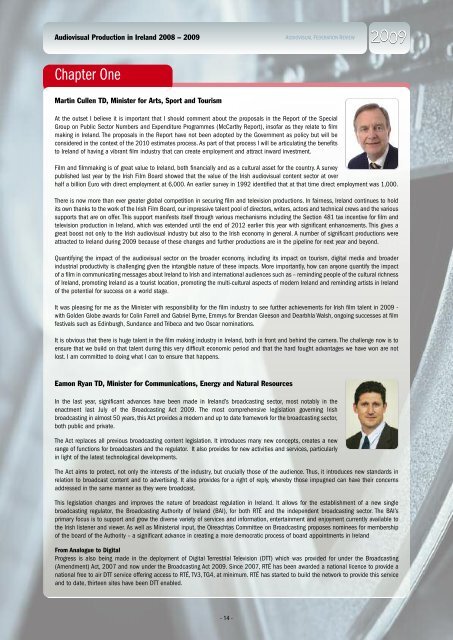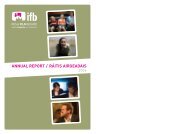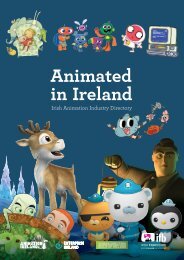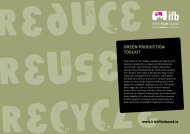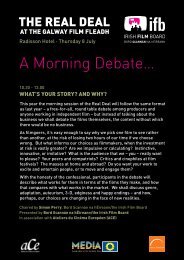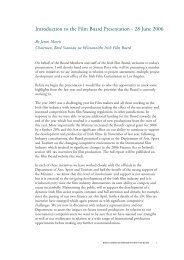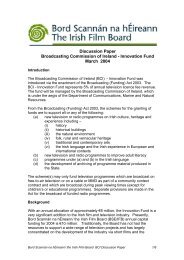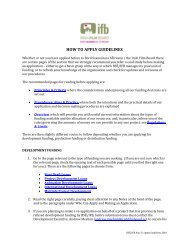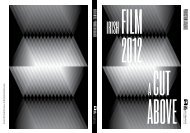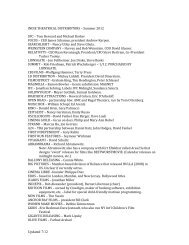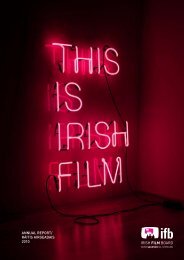IBEC Audiovisual Federation Report 2009 - Irish Film Board
IBEC Audiovisual Federation Report 2009 - Irish Film Board
IBEC Audiovisual Federation Report 2009 - Irish Film Board
You also want an ePaper? Increase the reach of your titles
YUMPU automatically turns print PDFs into web optimized ePapers that Google loves.
<strong>Audiovisual</strong> Production in Ireland 2008 – <strong>2009</strong>AUDIOVISUAL FEDERATION REVIEWChapter OneMartin Cullen TD, Minister for Arts, Sport and TourismAt the outset I believe it is important that I should comment about the proposals in the <strong>Report</strong> of the SpecialGroup on Public Sector Numbers and Expenditure Programmes (McCarthy <strong>Report</strong>), insofar as they relate to filmmaking in Ireland. The proposals in the <strong>Report</strong> have not been adopted by the Government as policy but will beconsidered in the context of the 2010 estimates process. As part of that process I will be articulating the benefitsto Ireland of having a vibrant film industry that can create employment and attract inward investment.<strong>Film</strong> and filmmaking is of great value to Ireland, both financially and as a cultural asset for the country. A surveypublished last year by the <strong>Irish</strong> <strong>Film</strong> <strong>Board</strong> showed that the value of the <strong>Irish</strong> audiovisual content sector at overhalf a billion Euro with direct employment at 6,000. An earlier survey in 1992 identified that at that time direct employment was 1,000.There is now more than ever greater global competition in securing film and television productions. In fairness, Ireland continues to holdits own thanks to the work of the <strong>Irish</strong> <strong>Film</strong> <strong>Board</strong>, our impressive talent pool of directors, writers, actors and technical crews and the varioussupports that are on offer. This support manifests itself through various mechanisms including the Section 481 tax incentive for film andtelevision production in Ireland, which was extended until the end of 2012 earlier this year with significant enhancements. This gives agreat boost not only to the <strong>Irish</strong> audiovisual industry but also to the <strong>Irish</strong> economy in general. A number of significant productions wereattracted to Ireland during <strong>2009</strong> because of these changes and further productions are in the pipeline for next year and beyond.Quantifying the impact of the audiovisual sector on the broader economy, including its impact on tourism, digital media and broaderindustrial productivity is challenging given the intangible nature of these impacts. More importantly, how can anyone quantify the impactof a film in communicating messages about Ireland to <strong>Irish</strong> and international audiences such as – reminding people of the cultural richnessof Ireland, promoting Ireland as a tourist location, promoting the multi-cultural aspects of modern Ireland and reminding artists in Irelandof the potential for success on a world stage.It was pleasing for me as the Minister with responsibility for the film industry to see further achievements for <strong>Irish</strong> film talent in <strong>2009</strong> -with Golden Globe awards for Colin Farrell and Gabriel Byrne, Emmys for Brendan Gleeson and Dearbhla Walsh, ongoing successes at filmfestivals such as Edinburgh, Sundance and Tribeca and two Oscar nominations.It is obvious that there is huge talent in the film making industry in Ireland, both in front and behind the camera. The challenge now is toensure that we build on that talent during this very difficult economic period and that the hard fought advantages we have won are notlost. I am committed to doing what I can to ensure that happens.Eamon Ryan TD, Minister for Communications, Energy and Natural ResourcesIn the last year, significant advances have been made in Ireland’s broadcasting sector, most notably in theenactment last July of the Broadcasting Act <strong>2009</strong>. The most comprehensive legislation governing <strong>Irish</strong>broadcasting in almost 50 years, this Act provides a modern and up to date framework for the broadcasting sector,both public and private.The Act replaces all previous broadcasting content legislation. It introduces many new concepts, creates a newrange of functions for broadcasters and the regulator. It also provides for new activities and services, particularlyin light of the latest technological developments.The Act aims to protect, not only the interests of the industry, but crucially those of the audience. Thus, it introduces new standards inrelation to broadcast content and to advertising. It also provides for a right of reply, whereby those impugned can have their concernsaddressed in the same manner as they were broadcast.This legislation changes and improves the nature of broadcast regulation in Ireland. It allows for the establishment of a new singlebroadcasting regulator, the Broadcasting Authority of Ireland (BAI), for both RTÉ and the independent broadcasting sector. The BAI’sprimary focus is to support and grow the diverse variety of services and information, entertainment and enjoyment currently available tothe <strong>Irish</strong> listener and viewer. As well as Ministerial input, the Oireachtas Committee on Broadcasting proposes nominees for membershipof the board of the Authority – a significant advance in creating a more democratic process of board appointments in IrelandFrom Analogue to DigitalProgress is also being made in the deployment of Digital Terrestrial Television (DTT) which was provided for under the Broadcasting(Amendment) Act, 2007 and now under the Broadcasting Act <strong>2009</strong>. Since 2007, RTÉ has been awarded a national licence to provide anational free to air DTT service offering access to RTÉ, TV3, TG4, at minimum. RTÉ has started to build the network to provide this serviceand to date, thirteen sites have been DTT enabled.- 14 -


